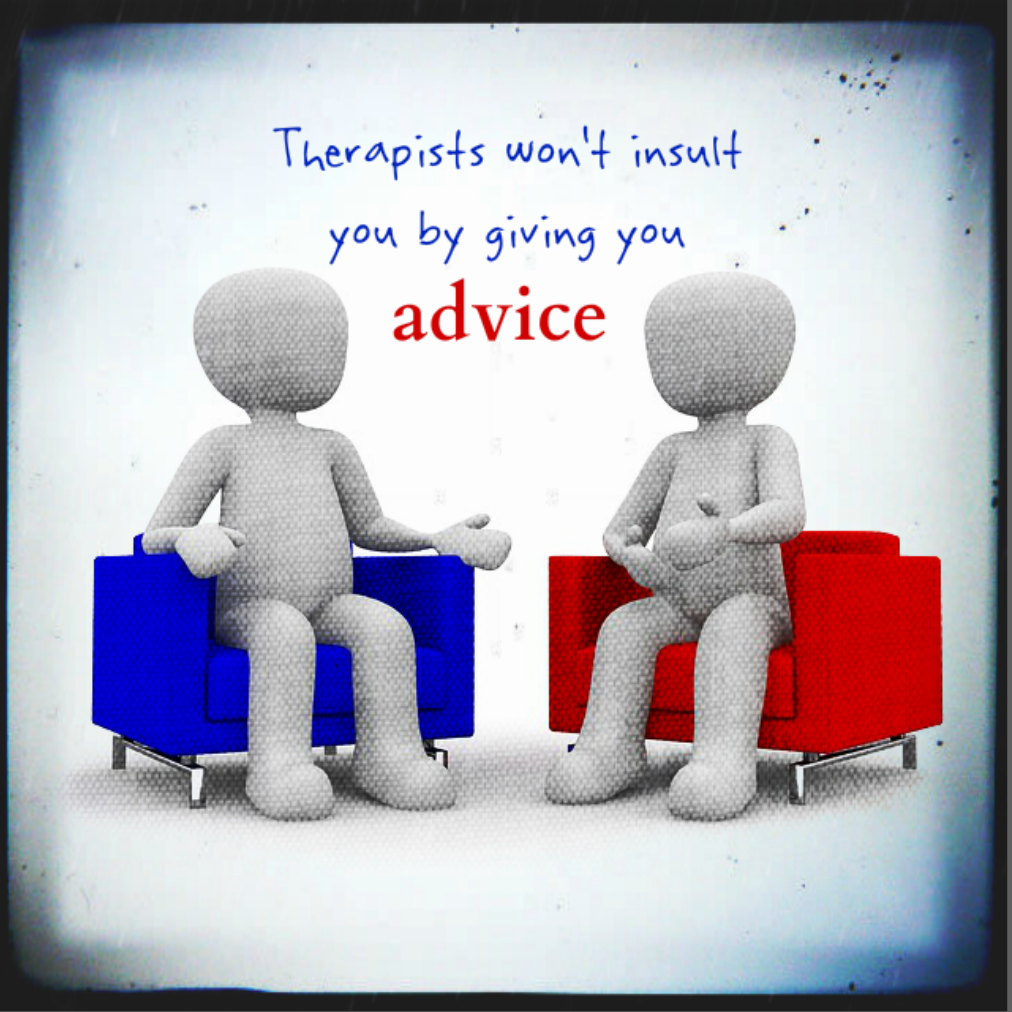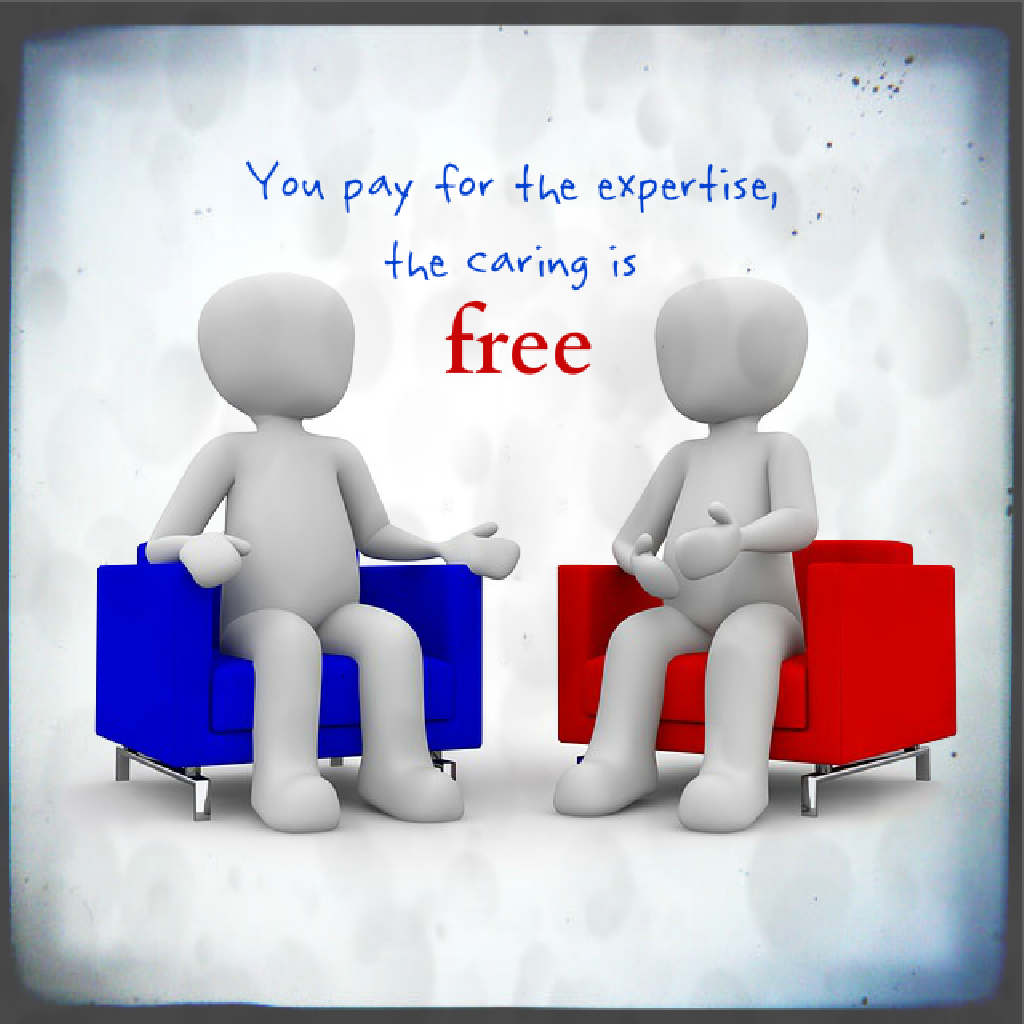Dear client,
When you come in for your first appointment, you may ask a question. I get asked this question a lot. So many clients, when they come for their first appointment give an outline of a very painful situation in their lives and then ask,
“What is your advice?”
There are different ways people say it, of course…sometimes it comes out like:
“So what do you think I should do?”
“Tell me what I do next?”
“How do I fix this?”
I get this.
When you’re stuck in a nasty, painful, complicated situation, you just want “out”. ASAP. Desperate to find a solution—and fast. Of course.
By the time you’re coming to see a therapist, you’ve often spent weeks struggling with it. Sleepless nights. Churning belly. Thumping heart. Turned inside out as you think about the situation over and over again.
By the time you’ve come to see the therapist, you are more than ready to be out of the situation and its accompanying pain and discomfort.
I’ve known that pain and discomfort too, in my own life. And I’ve looked forward to a therapist appointment, hoping that whatever happens in the office I will come out with a plan to make it all better. Quite desperate, actually, to have someone tell me what to do so it won’t hurt so much.
Sometimes, I wish that therapists had magic wands. One of those wands that I could wave and tap. A really fancy magic word that would make it all go away:
(I want the wand, but definitely not the outfit!)
To have spent days, months, or even years in a difficult situation is hard enough. And then to start seeing a therapist too—a challenge in itself.
When a therapist sees a client struggle to come to a session, struggle to talk about the struggle, and then simply struggle in the pain of being in the middle of it all…well, it’s at those moments, I, as a therapist want to quickly reach for that magic wand—if I had one.
Alas, I don’t.
When client comes to a therapist and asks for advice, it’s an honest question.
It’s an earnest, sometimes desperate question.
But the answer is generally not one that they are expecting.
I usually say something like:
If it was as easy as telling you what to do, I would. But here’s the thing: You’re smart, and you live in this situation 24 hours a day, 7 days a week. You’ve thought about this a lot already. I will not insult you by suggesting that after listening to you for an hour, I can tell you what to do. If you can’t figure it out knowing and living it, then I couldn’t possibly pretend that I know better than you.
There is no easy answer—because if there was, you would have already found it.
People usually give a sad acknowledgement that what I say makes sense. They wish that I knew and could tell them, but they understand. Therapists don’t have obvious answers when you are looking for one. Very few good therapists give “advice” in the first session.
Hal Anderson and I talked about how therapists don’t give advice, but do work to make therapy work for the client:

That can be disheartening for clients who have spent months summoning the courage to walk in the door.
It doesn’t stop there though.
No advice does not mean no help.
We may not give advice as therapists. But that does not mean we do nothing.
There is actually quite a lot we can do.
What I tell clients, after I tell them that it would be disrespectful to give advice, is this:
You are the expert of you. You know your world, your life, your past, and your feelings. That is super important to the process. And I am the expert of the process. I will ask you questions. I will hear you into deeper speech. We will work together to understand the situation. I believe that by working together, we can get some clarity and understanding and healing and growth. Then you won’t need my advice, because you will be able to move forward in light of your own wisdom that will emerge.
You see, client…you often know more than you realize. You often have an awareness that is hidden under the fear and the pain.
As we work through the process, together, that will become evident to you.
Your therapist respects that you inherently know more about you and your world than we do. More than we possibly could ever understand. We want to work with you to understand how and why you feel stuck, how you know that seemingly obvious solutions won’t work, and how this situation affects you in a unique way.
You are like none other, and when you explain how you work to us, you give us invaluable information as we work towards your goals with you. When you talk about your situation and your own responses, we hear things that you may not have thought about. We see strengths when you see only problems. You get to to hear yourself responding to different ways of looking at things, and that also spins into new insights.
A fresh perspective allows us to be creative, playful even, with a situation that has been thought through for so long in certain ways that deep ruts have formed for you. Our knowledge about how systems work, about how brains work, about shame and empathy and desire for being loved and to belong combines with your knowledge about your live—creating a powerful combo.
Sometimes, therapists are accused of always answering a question with a question.When not giving simple and trite advice to clients, television and movies often has us therapists answering every question with another question.
Gosh, as a client, I would find that infuriating.
Sometimes, we do explore the questions you ask…that can be hugely helpful.
Because often, a question is a question.
Questions deserve answers.
Not giving advice does not mean we endlessly nod and smile, and repeat your last sentence, or ask, “how does that make you feel” (over and over) as too many hokey Hollywood scenes would suggest. That is not good therapy.
For the record, I dislike the, “How does it make you feel?” question, and pretty much never ask it.
Though we won’t give advice, we will:
- Answer questions when you seek information about topics that we may know more about. Questions like: “What is the difference between a psychiatrist and psychologist?” “When does a person go see a doctor about depression?” “I want to read a book on ____. Can you recommend one?”
- Do what we can to ensure safety. When a person is feeling that their life is so painful, they are concerned they may end the life that gives the pain, we actively participate in planning to help you stay safe.
- Provide some structure when there is chaos. If a person is so anxious that it is difficult to focus, we will provide some grounding. We help you develop a plan if you’re so frazzled that nothing makes sense. We might give a few strategies when the internal storm feels out of control. That happens to all of us sometimes.
- Teach you about the process. Sometimes a client is concerned that a therapist will re-traumatize them by making them retell horrifying stories, or wonders how couple therapy works. If you want an explanation about how therapy works, we will do our best to let you know. You deserve to know what’s happening.
- Give you a chance to be heard, to let you know what we are hearing. We will notice patterns. We will notice what you haven’t noticed. We will look to explore your experience of the events that are happening outside, and see how your past experiences shape your current understandings.
- Do all the things that we have spent years learning to do in therapy school to help you better understand yourself in the situation, to work towards alleviating your suffering, to empower you to discover the answers for which you search. We help people actually feel their feelings. We work towards you being able to tolerate feeling your feelings without being flooded. All sorts of things that make it easier to be you in your situation.
- We don’t get paid to care. You pay for our expertise. But the caring comes for free. Because we are human beings who are passionate about people, about connections, about wanting healing for you. We don’t want you feeling like, without our advice, you are hung out to dry. We want you to feel like you were heard, and helped by a fellow human being. We love doing therapy, because our clients are such incredible human beings.

So, dear client, you may not get advice from us…what I trust is that you will get something much, much more important: a safe space where you can bravely find within yourself what is the best path forward for you.
Therapy isn’t easy. It isn’t cheap, in time or emotional investment. But it can move you forward in powerful ways. Call us, send us an email to inquire, or call someone closer to home or another therapist that is recommended.
Just go…and don’t be disappointed when you don’t get advice. Know that you will be getting something much, much more valuable.
Regards,
Carolyn






Write a Comment